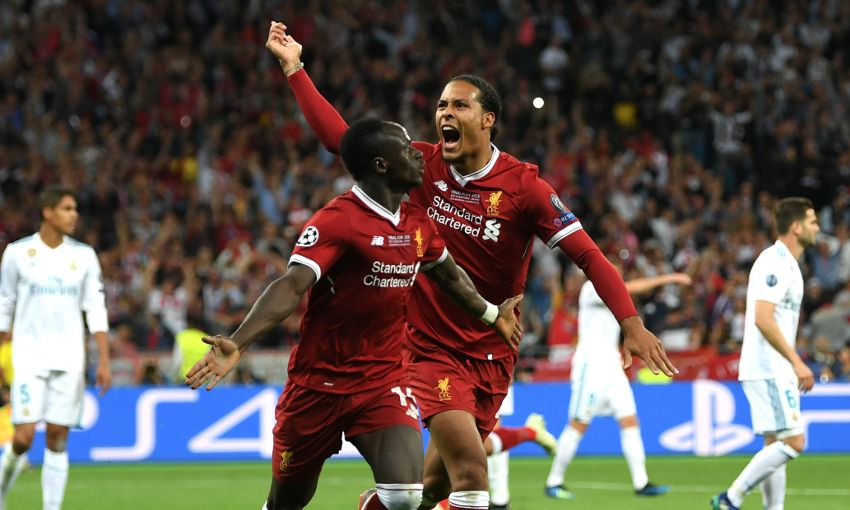There is nobody who handles losing quite as well as Liverpool. This is a taunt thrown our way by rival fans, who would undoubtedly have traded their seasons in a heartbeat to take our place in the Champions League final, but there is also a ring of truth about it. Defeat in Kyiv was cruel, and it was painful, but supporters left the stadium singing. You’ll Never Walk Alone proved as cathartic as ever, while Allez Allez Allez took on a defiant note: mark our words, we’re never going to stop. Soon, a video emerged of Klopp himself chanting at six in the morning, goofy smile firmly in place in spite of everything. Those outside of the Liverpool bubble might have questioned what on earth was going on – the team had, after all, just fallen short of glory by virtue of two of the worst goalkeeping mistakes ever witnessed at this level. Perhaps three words from a different song best sum it up: we are Liverpool.

Source: liverpoolfc.com
This club sticks together. At times, it has had to do so – the 96 on the collar of every Liverpool shirt is a poignant reminder that nothing that unfolds on the pitch is of any lasting importance. Even so, it would have been easy for supporters to turn on Karius following the final, but that is not The Liverpool Way. In a strange fashion, it was his personal woes that helped bring everybody together so quickly; even on social media, which usually has a knack of amplifying the very worst in people, the overwhelming message was one of support for the young German. It is unlikely that there is anything that can be said to the 24-year-old that will stop him looking back on this match with horror in quiet moments for the rest of his life, but supporters looked to take some of the burden from him with a simple message. You’ll Never Walk Alone. People can say that we don’t sing it as loudly as we once did, or that everyone is now too bothered about filming it to belt it out, and perhaps there is some truth to this – when it really matters, though, it is more than a song. It is an ethos, one which enables fans to place their views on the long-term goalkeeping situation aside for a moment and just console a young man who needs support.
For his part, Karius also showed an understanding of how things are done at this club. It is telling that the first thing he did after the final whistle was go to the fans – disconsolate though he was, he knew that these were the people from whom forgiveness must be sought. It took courage to do this, and one need not look very far to think of players who would have just disappeared down the tunnel. Things like this mean something. Supporters should be at the heart of any club, and when the players recognise this an unbreakable bond forms; this is the same kind of bond that can carry a team through to a European final by sheer strength of support, sheer volume of songs. It produces an intensity capable of emanating from the stands and into the heavy metal football unfolding on the pitch. It is hard to say whether Karius himself will have a long-term future at Anfield, but if he leaves he can do so with his head high and with the respect of the only people that matter.
Mere days after the defeat, Liverpool announced a new addition to the team. Fabinho, snatched from under the noses of Manchester United, went some way to lifting spirits. In the midst of the excitement, it was easy to miss one comment from Klopp: “We have signed a fantastic player, but someone who is an equally fantastic person”. For this to be a preliminary comment about a signing is, in the world of modern football, quite remarkable – certainly it is anathema to the mindset of a coach like Mourinho, who can practically be heard scoffing at such a comment. Klopp, however, is not of the same mould. He is a team-builder; he recognises the importance of getting a group together, keeping them tightly-knit, and going on to achieve things as a unit. More than that, he intrinsically understands Liverpool: the parliamentary seat of Liverpool Walton has not been occupied by a Conservative for over fifty years, and the city and the club immediately embrace those who show a social conscience. Andrew Robertson has won everyone over with his immense performances, but also with his promotion of the local foodbanks. Salah is adored for his forty-four goals, but also for the joy he has brought to schoolchildren in the area. “This means more” is the tagline emerging from the club marketing department of late – it would be naïve to deny that this is at its heart part of a campaign driven towards selling replica shirts, but the sentiment does ring true. Of course, first and foremost Klopp and the fans want to put together a team of winners, but not at any cost – it does not profit a man to gain the whole world, but forfeit his soul.
This is the great consolation. The soul of the club is more than just intact, it is thriving under the management of a man who truly understands it. The core of the team also looks set to hold together – this group have made memories together on a journey all the way to the final, and they will be determined to return to complete the job. Already, additions are being made to address the weaknesses that meant we ultimately fell short: there are big reasons to be hugely optimistic into next season and beyond. This does not remove the pain of losing the final, and nor should it: although Liverpool’s ethos goes far beyond winning, it should not be forgotten that this club has victory in its very DNA. However, the regeneration of this footballing giant is well underway, and it’s never going to stop.
James Martin
Latest posts by James Martin (see all)
- A Pressing Concern - February 8, 2021
- Manchester City 1-1 Liverpool: Did Klopp’s formation gamble pay off? - November 10, 2020
- The big Premier League preview Part Two – The bottom half - September 10, 2020
